Traveling on a budget? Or are you looking for the perfect rental for you that makes your vacation extra comfy? If you are an avid or an excited traveler, you must have stayed or at least heard about Airbnb. How about checking other apps like Airbnb?
For the ones who don’t know yet, Airbnb is a platform that connects people who are looking for accommodation with those who provide properties in the locality.
Whether you’re looking for a condo or the perfect beach house, this holiday rental platform allows you to book any space that suits your style. Moreover, if you’re looking for ways to monetize your property, Airbnb helps you list your space and earn an additional income. Therefore, Airbnb and similar apps offer a win-win situation to both hosts and renters.
If you wish to check out what apps are like Airbnb, you are just at the right place. We’ve handpicked the top applications and reviewed them ourselves. Moreover, if you also need to know the benefits these apps offer to you as a host and renter, we’ve got answers for that as well. So, without further ado, let’s check out the top 7 apps like Airbnb that you can use to book holiday homes.
Airbnb: – Key Market Stat
Founded in 2007, Airbnb has revolutionized the travel industry, transforming the way we think about accommodation. From humble beginnings with an air mattress on the living room floor, the platform has ballooned into a multi-billion dollar enterprise with a global footprint.
Let’s delve into some of the impressive statistics that showcase Airbnb’s remarkable growth as of 2024:

- Valuation soars: With a valuation of $74.6 billion as of October 2023, Airbnb’s worth has jumped a staggering 45.9% in just the first ten months of the year, demonstrating continued investor confidence.
- A global marketplace: The platform boasts over 7 million active listings scattered across an impressive 220 countries, offering travelers a diverse range of unique and authentic stays, regardless of their destination.
- Millions join the community: With over 200 million active users worldwide, Airbnb has fostered a vibrant community of travelers and hosts, connecting people from different cultures and backgrounds.
- Financial success: In 2022 alone, Airbnb generated $8.4 billion in revenue and $1.893 billion in income. This financial prowess highlights the platform’s ability to create a sustainable business model within the sharing economy.
- Empowering hosts: The average Airbnb host earned $14,000 in 2022, showcasing the platform’s potential to generate significant income for individuals. Interestingly, over 60% of U.S. hosts rent out their primary residence while they’re on vacation, demonstrating both the flexibility and income potential offered by Airbnb.
These statistics paint a vivid picture of Airbnb’s remarkable journey. From its disruptive beginnings to its current position as a global leader in the travel industry, the platform continues to evolve and adapt, offering a unique and convenient way to travel and explore the world. Whether you’re a seasoned traveler seeking an authentic experience or a host looking to share your space and earn some extra income, Airbnb has something to offer everyone.
How Does an app like Airbnb Works?
Airbnb, a name synonymous with unique stays and local experiences, has transformed the way we travel. But how exactly does it work? Let’s dive into the seamless process that connects hosts offering their spaces with guests seeking an adventure:
Opening Your Doors:
- List Your Space: Whether it’s your entire home, a charming guest room, or even a cozy cabin, Airbnb empowers you to become a host. Simply list your space, outlining its availability and setting your desired price
Finding Your Perfect Place:
- Discover and Book: As a guest, embark on a journey of exploration. Search for listings based on your desired location, budget, and amenities. From bustling city apartments to tranquil countryside retreats, the diverse options cater to every travel style.
Building Trust and Connection:
- Communication Made Easy: Airbnb fosters safe and secure communication between hosts and guests. Discuss details about your stay, ask questions, and ensure a smooth check-in process, all through the platform’s user-friendly interface
Seamless Transactions:
- Secure Payments: Leave the financial worries behind. Airbnb handles the entire payment process. Guests pay securely through the platform, and the host receives their payment after the guest checks in, ensuring peace of mind for both parties
Building a Reputable Community:
- Reviews Matter: Share your honest experiences! After your stay, both hosts and guests can leave reviews for each other. This feedback system helps build trust and fosters a community built on respect and understanding
Unwavering Support:
- Never Alone: Airbnb offers 24/7 support to both hosts and guests. Additionally, hosts benefit from a host protection insurance program, providing up to $1 million in coverage for property damage, ensuring a secure and protected experience
Top 7 Apps like Airbnb To Book Vacation Rentals
Let’s look at the top alternative apps to Airbnb available to us today.
1. Vrbo
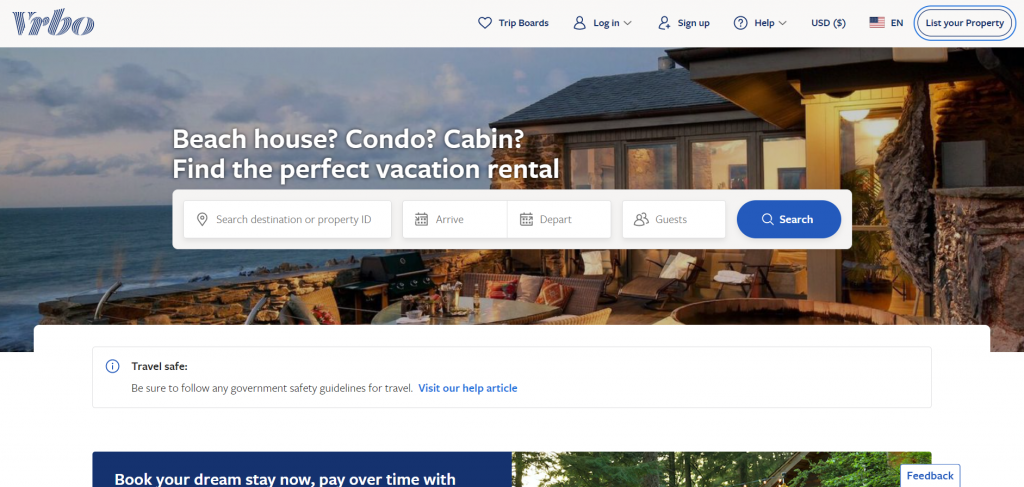
Vrbo stands for Vacation Rentals By Owners. Although it was founded in 1995, it is gradually becoming more popular and becoming one of top alternatives to Airbnb available today. The marketplace offers 2 million+ vacation rentals, including condos, cabins, lake rentals, beach houses, and more. Whether you’re planning a weekend getaway or a family trip, Vrbo offers homes that are ideal for trips of all types.
Moreover, you receive additional amenities like extra bedrooms or a full kitchen with appliances, and so on. You can also opt for additional features such as a private pool or hot tub, or outdoor entertainment space. If you’re looking for an additional source of income, you can list your property on the platform and earn big.
Pros:
- Wide selection of rentals catering to diverse needs of families, couples, singles, and even pet owners.
- Useful filters for easy and efficient search based on preferences.
- Simple and secure booking procedure, ensuring a hassle-free experience for users.
Cons:
- Limited shared spaces or homestay options, which might not be ideal for travelers seeking a more immersive experience.
- Accommodation options on Vrbo can be relatively costlier compared to other platforms, potentially affecting budget-conscious travelers.
2. Booking.com
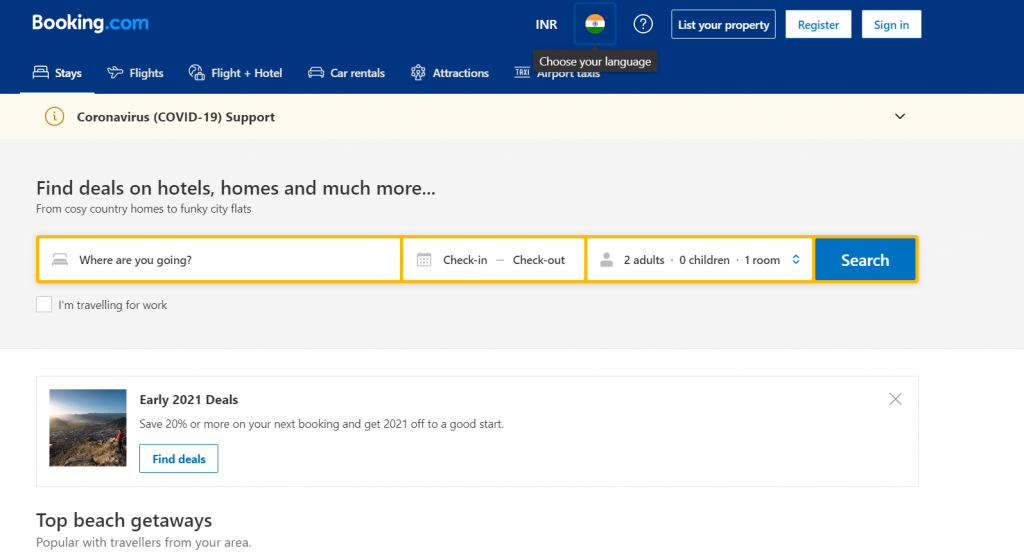
Founded in 1996, Booking.com is one of the leading digital travel companies. It has 28 million+ listings and provides hotels and homes across 120,000 destinations worldwide. Unlike other similar apps like Airbnb that mostly offer only vacation rentals, Booking.com offers a variety of services.
Users can book stays, flights, car rentals, city attractions, airport taxis, a combination of air tickets and hotels, and so on. Thus, whether you’re looking for a leisure stay with spot-on service or a cozy stay in a vacation rental, booking.com has you covered. Just like all the Airbnb alternatives, their portal allows you to list your property for free.
Pros:
- Booking.com offers a wide range of lodging alternatives, ensuring there’s something for every type of traveler.
- The platform is suitable for all sorts of tourists, from solo adventurers to families and business travelers.
- A plethora of handy criteria allows users to narrow down search results and find the perfect accommodation.
- Booking.com provides discounts and deals for reservations, making it attractive for budget-conscious travelers.
- With excellent global coverage, Booking.com offers options in various destinations worldwide.
Cons:
- Some customers have reported issues with improper bookings or discrepancies between the reservation and the actual accommodation.
- The customer service on Booking.com can be perceived as unreliable, leading to frustration in case of problems or inquiries.
- The abundance of information on the website can sometimes feel overwhelming or confusing for users trying to make a decision.
3. Plum Guide
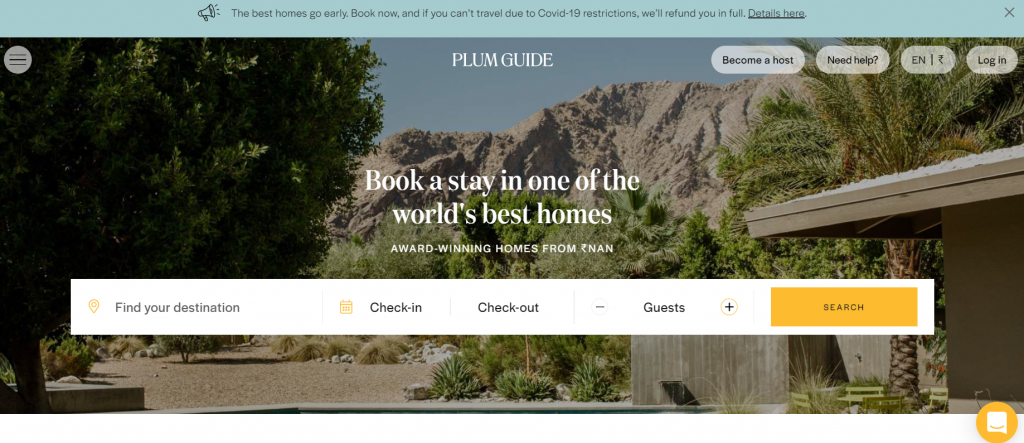
Plum Guide was founded in 2015 and is relatively new to the vacation rental and holiday homes industry. However, this doesn’t limit the company to act as a top player. It is continually gaining more popularity due to its rigorous vetting process. It vets every holiday home across cities in the U.S, U.K, and Europe, and accepts only the top 1%. This means that for every home that is listed on the platform, 99 don’t. With over 30,000 of the world’s most remarkable homes, operating in over 30 countries and 500 locations worldwide. they’re gearing up to launch in 60 new destinations by the end of 2024.
They also have their own 150-point Plum Test. All the vacation homes that pass this test guarantees the guests exciting spaces with hotel-like amenities (fast WiFi, quality linens, fluffy towels, well-stocked kitchens) and other benefits such as characterful neighborhoods that are well connected for exploring the city.
Pros:
- Plum Guide offers high-quality lodging alternatives, ensuring a luxurious and comfortable stay for travelers.
- The platform provides assurance that the status of the rentals matches the description and images, promoting transparency and trust.
- The booking procedure on Plum Guide is straightforward and user-friendly, making it easy for travelers to secure their ideal accommodation.
Cons:
- Plum Guide may have limited options compared to larger booking platforms, potentially limiting choices for travelers in some destinations.
- The platform’s coverage may be limited to certain cities or regions, which could be a drawback for travelers seeking accommodations in less popular or remote areas.
4. TripAdvisor Rentals
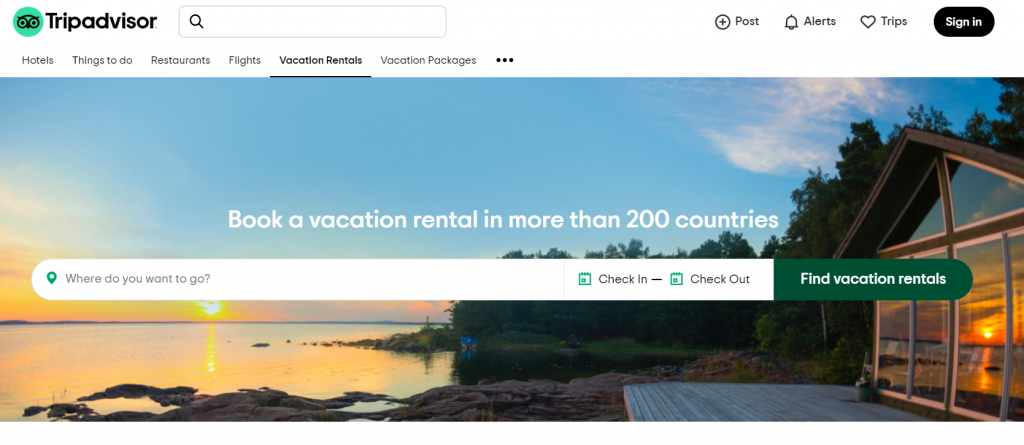
Founded in 2000, TripAdvisor is an online travel company that allows users to make online hotel reservations and bookings for transportation, travel experiences, and much more. It is very similar to booking.com in terms of services offered. To keep up with the trend of holiday homes and decrease in demand for hotels, the company decided to provide a separate service known as TripAdvisor Vacation Rentals.
All you need to do is select your location, check-in, and check-out date, and voila! You’ll see the best spaces available that offer exceptional services and privacy.
Pros:
- Tripadvisor Rentals offers a simple and easy-to-use site, making it convenient for users to browse and book accommodations.
- The platform provides a wide range of options, ensuring there is something for every type of traveler and budget.
- With a significant number of user reviews, Tripadvisor Rentals offers valuable insights and feedback from previous guests.
- The platform is suitable for all sorts of travelers, from solo adventurers to families and groups.
Cons:
- Tripadvisor Rentals is susceptible to skewed or biased reviews, potentially impacting the accuracy of overall ratings.
- Some users have raised concerns about the presence of many fake reviews, which can be misleading for decision-making.
5. HomeExchange
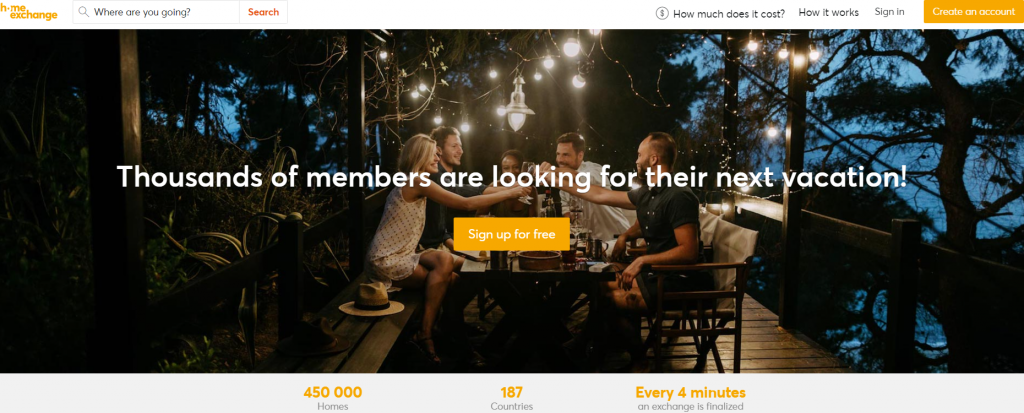
HomeExchange is different from other apps similar to Airbnb. It offers a platform for home and apartment exchanges. This exchange works in two ways – The Classic Exchange (reciprocal) and Exchange with GuestPoints (non-reciprocal)
In the reciprocal exchange, two families exchange each others’ homes either simultaneously or on different dates. On the other hand, non-reciprocal exchanges work with GuestPoints and are ideal when the other family doesn’t wish to stay at your home in return. They can use the GuestPoints that you offer and stay at another member’s home wherever they like.
For instance, you and your family go on a 5-night vacation to Paris, France, and stay at another Member’s home for 100 GuestPoints per night. The total 500 Guestpoints that you offer to your hosts for your vacation can be used by them to organize their vacation. They have around 270.000 homes ready to be rented for you.
Pros:
- Extensive Network: HomeExchange app provides access to a vast network of homes worldwide, offering a diverse range of destinations for travelers.
- Cost Savings: By exchanging homes with other users, travelers can significantly reduce accommodation costs, making it a budget-friendly option for vacations.
- Cultural Immersion: Staying in a local home allows travelers to experience the destination from an authentic perspective, fostering cultural immersion.
- Personalized Experiences: HomeExchange offers unique and personalized experiences, as each home reflects the owner’s style and preferences.
Cons:
- Property Standards: HomeExchange homes vary in terms of standards and amenities, which may not always meet the expectations of all travelers.
- Liability Concerns: There can be concerns related to potential damages or accidents during the exchange, although most exchanges have insurance coverage.
- Security: While HomeExchange emphasizes trust and verification, some users may still have concerns about safety and security while staying in someone else’s home.
6. HouseTrip
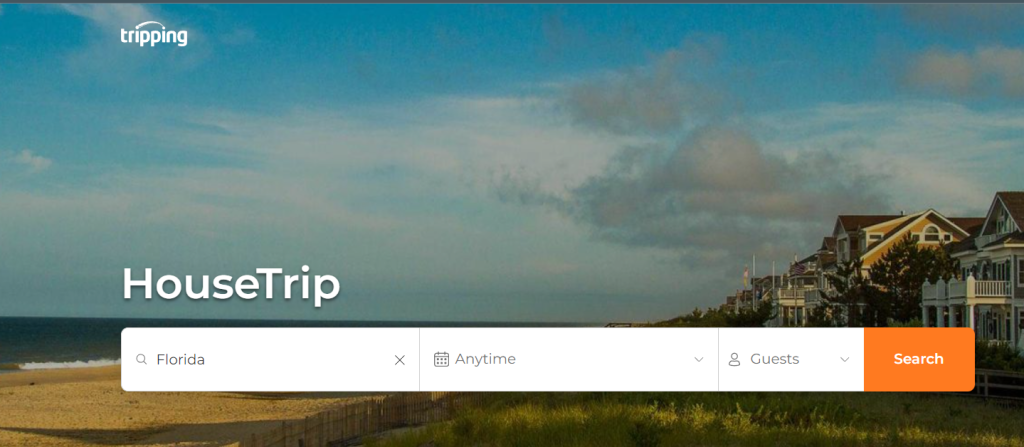
HouseTrip is another Airbnb alternative that is a part of Tripping. It is one of the largest vacation rental websites in the world and has over 350,000 rentals across the U.K and abroad. Their spaces are an ideal alternative to hotels and offer amenities such as more space, extra bedrooms, a kitchen, and WiFi and laundry facilities at no extra charge.
With over 300,000 holiday rentals in more than 20,000 global locations, HouseTrip gives travelers access to a range of unique accommodations, from remote lighthouses to luxury sea forts.
Moreover, it is a great platform for hosts as HouseTrip offers a free listing and takes just 3% (VAT excluded) on confirmed bookings. You can manage everything through their easy-to-use dashboard.
Pros:
- HouseTrip app offers a wide selection of vacation rentals, providing various accommodation options to suit different preferences and needs.
- The platform often features unique and charming properties, allowing travelers to experience a more authentic and personalized stay.
- Users can benefit from the convenience of a secure and straightforward booking process, making it easy to plan and confirm their vacation rental.
- HouseTrip offers a platform where homeowners can list their properties, providing an opportunity for property owners to generate income from their rentals.
Cons:
- While HouseTrip offers a diverse range of vacation rentals, the options might be limited in certain destinations compared to larger booking platforms.
- The quality and standards of accommodations can vary, and some travelers might encounter inconsistencies between property descriptions and the actual rental.
- Customer service and support may not always be as responsive or efficient, leading to delays in resolving issues or inquiries.
7. Onefinestay

As its name suggests, Onefinestay offers the finest homes and villas in the most dreamy destinations! Their spaces are categorized into two categories – City Collection and Villa Collection. Moreover, they are known for their one-of-a-kind service to guests, homeowners and travel partners around the world.
They offer exceptional facilities, such as pools to private beaches, fitness and games rooms or beautifully landscaped gardens in their Villa collection. Apart from this, the best part about the platform is that it offers a 2-day cancellation period for a selection of homes.
Therefore, whether you want to experience the best of the city life or go on a dream-like vacation, Onefinestay can be your best bet.
Pros:
- High-end and luxury accommodations: Onefinestay offers a curated selection of luxurious and high-end properties, providing a premium experience for travelers.
- Professional management and services: The app ensures that properties are professionally managed, and guests receive top-notch services during their stay.
- Unique and distinctive homes: Onefinestay features distinctive and one-of-a-kind homes, allowing travelers to experience exceptional stays.
Cons:
- Limited availability: As Onefinestay focuses on high-end properties, the selection may be limited in certain destinations or less-popular locations.
- Higher price range: The luxury and high-end nature of the accommodations may result in higher prices compared to other more budget-friendly options.
- Limited global coverage: Onefinestay may have limited coverage in certain regions, which could restrict options for travelers seeking accommodations in specific locations.
How to Make an App Like Airbnb?
Here some elobrated steps to follow to make an app like airbnb
Step 1: Craft a Comprehensive Business Plan:
Lay the foundation for your Airbnb-like app by creating a well-defined business plan that outlines your goals, target audience, and strategies for success. A structured plan will keep you organized throughout the development process.
Step 2: Collaborate with Skilled Developers:
Partner with a proficient development team to bring your vision to life. You have the choice to work with in-house developers or outsource to experts who can efficiently execute your app’s development.
Step 3: Design User-Centric Interface:
Prioritize a user-friendly design that ensures an intuitive and visually appealing interface. A seamless UI/UX is crucial to retain users and encourage engagement with your app.
Step 4: Integrate Essential Features:
Begin by incorporating fundamental features to create an Airbnb clone app, and then leverage the Minimum Viable Product (MVP) approach to gather user feedback and identify their preferences. Use this input to enhance your app with advanced features, setting it apart in the market.
Step 5: Thoroughly Test the App:
Before launching, conduct rigorous testing to identify and resolve any bugs or glitches. Providing a smooth and error-free user experience is vital to retaining and attracting users.
Step 6: Launch and Regular Updates:
Release your app to the market, but the journey does not end there. Regularly update your app to enhance functionality, introduce exciting new features, and respond to changing user needs.
Step 7: Market and Promote:
Develop a robust marketing strategy to promote your app to your target audience. Utilize various digital marketing channels to build awareness and drive user acquisition.
Step 8: Monitor and Analyze:
Continuously monitor user engagement and app performance through analytics. Gather user feedback and make data-driven decisions to optimize the user experience and achieve sustainable growth.
Development Tech Stack for an App Like Airbnb:
To efficiently build the framework for an Airbnb-like app, it’s crucial to familiarize yourself with the following programming languages and frameworks:
- Frontend Frameworks: Utilize powerful frontend frameworks such as Angular.js, Vue.js, and React.js to develop an intuitive and responsive user interface for your app.
- Server-side Technologies: Leverage cloud platforms like AWS, Azure, Google Cloud, and DigitalOcean to ensure seamless scalability and reliable hosting services.
- Backend Frameworks: Choose from versatile backend frameworks like Django, Node.js, or Ruby to handle the app’s core functionality and data processing efficiently.
- Database Management Technologies: Employ robust database management technologies like MySQL, MongoDB, PostgreSQL, MSSQL, and Azure DocumentDB to store and manage user data securely.
- Network Caching Services: Optimize app performance with network caching services like Redis and Nginx, reducing response times and enhancing user experience.
Benefits of Using Apps Like Airbnb to Renters
- As a renter, you can see a wide selection of vacation rentals and exclusive properties. You can view and book the one that suits you best.
- Hosts can be very friendly and hospitable. You can think of them as your own personal concierge as they know about the best spots in town.
- Airbnb alternatives offer vacation rentals and holiday homes that are much more economical than hotels.
- You can customize your search and book spaces according to your preferences and location. For instance, price, type of property, amenities, and so on.
- You can use Airbnb alternatives to book a home for parties and events as well. The booking process on Airbnb is typically straightforward and user-friendly. Renters can easily browse available properties, view photos, read descriptions, and book accommodations with just a few clicks.
- Airbnb offers flexibility in terms of check-in and check-out times, as well as customizable amenities. Renters can choose properties based on specific features, such as free Wi-Fi, pet-friendly options, or accessibility features, tailoring their experience to their individual needs.
Benefits of Using Apps Like Airbnb to Hosts
- If you furnish your property well and add photographs on the apps, you can get a lot of people interested in it. Thus, you can earn a good amount of money with all the renters coming in.
- Most of the apps similar to Airbnb offer free listings. You can add descriptions and captions and list your property for free.
- These apps allow you to add and update your house rules and policies so that the guests stay compliant with them.
- You can select your own pricing and decide how much you want to charge per night, week, or month.
- You’ll get the experience of being a part of the hospitality industry.
- Hosts have control over accepting or declining booking requests. This allows hosts to manage their availability and choose guests who align with their house rules and preferences.
- Listing a property on Airbnb is generally straightforward. Hosts can create a listing with details about their property, upload photos, set pricing, and specify house rules. The platform also provides guidance on optimizing listings to attract potential guests.
Conclusion
And that’s a wrap! These were our top 7 picks for apps like Airbnb and how to make one that you can use and get the most out of your dream vacay or make your own platform! Whether you’re a host or a renter, you should ensure that your payment or property is protected and covered in the rare events of mishaps.
Looking to make an app like Airbnb ?
If you’re a budding entrepreneur or a startup looking to make an app like Airbnb, we can help you with that as well. Get in touch with us and start building your dream application today. Don’t forget to check out our portfolio of mobile applications.
Build Better Solutions With Idea Usher
Professionals
Projects
FAQs
Here are some of the most frequently asked questions based on apps similar to Airbnb.
Q. Is Airbnb cheaper than hotels?
Ans: Based on the demand rate and season, Airbnb can be cheaper than hotel rates.
Q. How is Vacasa different from Airbnb?
Ans: Vacasa is a property management company that provides end-to-end service, whereas Airbnb has a peer-to-peer model.
Q. What is comparable to Airbnb?
Ans: Various websites and apps such as VRBO, Homestay, The Plum Guide, etc., can be used to Airbnb alternatives.
Q. Is Airbnb cheaper than VRBO?
Ans: The guests are charged a service fee of 6% to 15% on VRBO. Compared to the 16% service charge in Airbnb, VRBO is the cheaper option.
Q. Why is Airbnb so expensive?
Ans: The rates of Airbnb fluctuate based on the demand for a rental. Higher the market, the higher the prices.






















